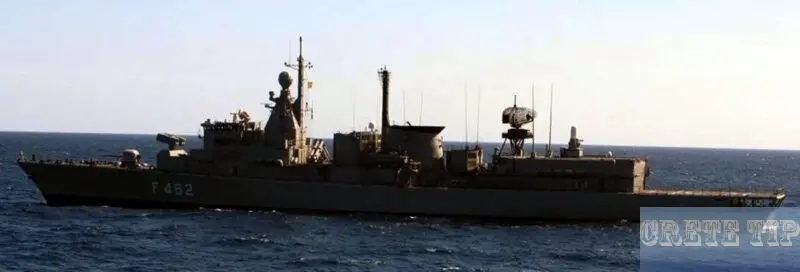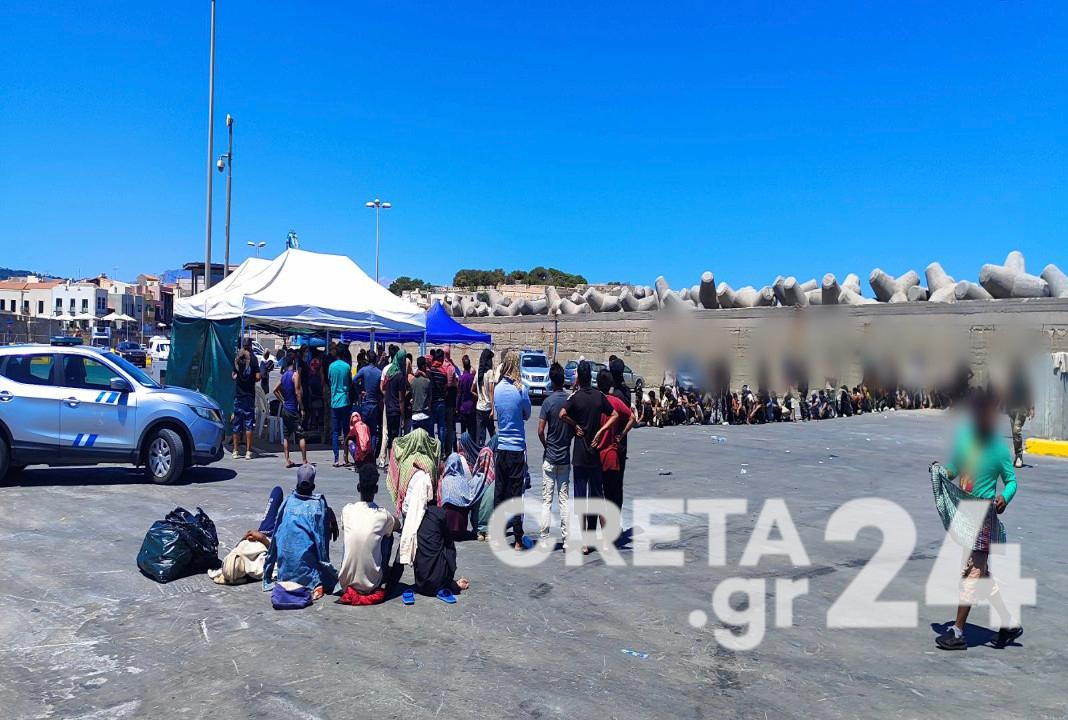Invasion of migrant boats on Crete: over 1,200 within a few hours.
Crete’s seen a sharp uptick in migrants showing up on its beaches lately, some even landing right in the middle of busy tourist spots. Locals and visitors have definitely noticed, and it’s put a spotlight on the ongoing scramble to manage the surge in migration here.
In just the past day, over 840 migrants reached Crete and Gavdos. This steady flow is putting a real strain on local authorities and reception centers, especially around Heraklion, as more people arrive seeking safety and a place to stay.
Large-scale rescue missions near Crete and Gavdos
Greek authorities have had their hands full lately, launching major sea rescues for hundreds of migrants in trouble near Crete and Gavdos. The Joint Search and Rescue Coordination Center, the Hellenic Coast Guard, and other vessels all worked together and pulled over 840 people out of the water in just one day.
One big rescue happened about 25 nautical miles southeast of Gavdos. There, 430 people packed onto an overloaded fishing boat got help from a Coast Guard patrol and a Panamanian-flagged tanker, which brought everyone safely to Agia Galini port.
In a separate case, a FRONTEX vessel picked up 96 migrants from two small inflatables. It’s a reminder that these waters can be risky, and the rescues just keep coming.
Most migrants are coming from North Africa and the Middle East, places hit hard by conflict and instability. The coastlines around Crete and Gavdos have really seen a spike in arrivals, forcing local authorities to act quickly.
The area near Paleochora has also turned into a busy hotspot for search and rescue crews. Greece has responded by beefing up its maritime presence, even sending two frigates near Libyan waters.
This is all part of a bigger push to work with Libya and European partners, hoping to stop migrants from leaving on unsafe boats and cut down crossings before they even leave Libya. High-level talks are ongoing, though it’s anyone’s guess how much progress they’ll actually make on migration flows and security.
Rescue Efforts Summary |
Details |
|---|---|
Number of lives saved |
Over 840 in one day |
Location of major rescue |
25 nautical miles southeast of Gavdos |
Migrants rescued from vessels |
430 from fishing boat, 96 from dinghies |
Port for disembarkation |
Agia Galini |
Authorities involved |
Hellenic Coast Guard, FRONTEX, Coast Guard vessels |
Main migrant regions of origin |
Middle East, North Africa, Egypt, Bangladesh |
Greece deploys naval forces to curb migration towards Crete

Greece has ramped up efforts to block a new migration route from Eastern Libya to Crete. The government sent naval vessels to patrol the waters near Libya, using both patrols and cooperation with Libyan officials to stop migrant boats before they reach Greek beaches.
When they spot migrant boats, Greek forces coordinate closely with Libyan authorities to intercept and return them. The idea is to stop organized smuggling networks from turning this into a regular route.
The operation includes:
- Sending frigates and patrol ships near Agia Galini and southern islands
- Watching migratory flows with support from Frontex
- Mixing deterrence and support to cut back on arrivals
New Arrivals in Palaiochora: 450 Rescued Refugees – No Shade, Intense Heat Marks First Reception at the Harbour – See Images
About 450 migrants landed at Palaiochora port, near Chania, after rescue operations in Crete’s southern seas. Around 300 arrived by a Frontex vessel, and another 150 were expected soon on a cargo ship.
Rescue efforts are ongoing as the area keeps seeing new arrivals. Locals, the Municipality of Kandanos-Selino, and the Selino Civil Protection Volunteer Group all chipped in to help welcome the rescued migrants.
The port offers zero shade, and the heat is relentless—tough conditions for both migrants and those helping out. Men, women, and kids all waited near the fishermen’s café or along the quay, some still coming ashore in boats as others rested in groups.
Everyone rescued is supposed to be moved to Agia village, where over 100 migrants from earlier rescues are already staying. The Hellenic Coast Guard and Frontex are leading these ongoing operations in the south of Crete.
Detail |
|
|---|---|
Number of rescued migrants |
Approximately 450 |
Arrival vessels |
Frontex boat, cargo ship (expected) |
Location |
Palaiochora port, southern Crete |
Organisations involved |
Coast Guard, Frontex, local volunteers, municipality |
Current migrant housing |
Agia village, near Palaiochora |
Challenges at harbour |
No shade, high temperatures |
Photos and videos on social media show groups of migrants scattered throughout the port, underlining the tough conditions and the mounting strain on local services as more people keep showing up.
Migration: Removal of the Advanced Offshore Patrol Vessel from Crete, New One Arrives
The coast guard just pulled its advanced offshore patrol vessel 920 from Crete and sent it to Alexandroupoli. That ship played a key role in monitoring and managing arrivals, but now a replacement patrol boat is on the job in Crete.
On Monday afternoon, another landing happened at Chrysostomos beach near Kalo Limenes. Authorities counted 68 arrivals, all reportedly Sudanese. They’re expected to be moved to the port of Heraklion for processing.
Another group of about 30 migrants was spotted offshore and brought to Kalo Limenes by the new patrol vessel. The authorities keep patrolling and moving quickly to handle new arrivals.
Later that evening, 167 migrants who arrived over the weekend left Heraklion port on a scheduled ferry. Another 67 from Saturday are set to leave soon. The flow just doesn’t seem to slow down.
Key Facts |
Details |
|---|---|
Vessel relocated |
Advanced patrol vessel 920 moved from Crete to Alexandroupoli |
Replacement vessel |
New offshore patrol boat sent to Crete |
Recent arrivals (Monday) |
68 migrants landed near Kalo Limenes (all Sudanese) |
Additional offshore group |
About 30 individuals transferred to Kalo Limenes |
Recent deportations (weekend) |
167 migrants left Heraklion port on ferry |
Pending departures |
67 migrants scheduled to depart after the weekend |
Modern patrol vessels remain crucial for spotting and assisting migrants arriving by sea. The steady flow of arrivals and transfers keeps testing the limits of local facilities and response teams.
Crete stays at the center of this migration route, so authorities have to stay alert and ready. Regular patrolling, quick rescues, and fast coordination for onward transport are all part of the effort.
Bringing in new patrol vessels is supposed to help, but with the way things are going, it’s hard to say if it’ll be enough.
Crete Under Pressure: Over 1,200 Migrants Arrive in Hours – Local Authorities Strained, Strong Criticism of Government
Crete’s in a tough spot right now. More than 1,200 migrants landed on the island in just a few hours.
Local municipalities are scrambling to keep up. They’re struggling to manage the sudden influx, and a lot of migrants are stuck in rough conditions—dealing with the heat and barely any facilities.
In places like Chania, Rethymno, and Paleochora, officials have put migrants in areas never meant for long-term stays. The commercial port of Rethymno is now sheltering over 400 people right on the hot asphalt.
Volunteers tried to set up makeshift shading to keep people from getting sick in the heat. Meanwhile, another site near Chania expects nearly 600 migrants, and people are worried about overcrowding getting worse.
Local authorities have stepped in with emergency measures, handing out food and water. Still, they keep warning that their resources and infrastructure just can’t handle this kind of pressure.
Municipal officials sound pretty frustrated. They’ve started blaming the central government for not offering enough support or planning ahead.
Table: Migrant Arrivals and Locations in Crete
Location |
Migrants Arrived |
Notes |
|---|---|---|
Rethymno Port |
442 |
Temporary containment, heat risks |
Chania (Agiá) |
About 590 |
Overcrowded former market area |
Paleochora Port |
408 (305+103) |
Additional 30 expected elsewhere |
Other locations |
98+ |
Includes small arrivals at other points |
Local leaders say tensions are rising among migrants. The crowded conditions and lack of real shelter aren’t helping anyone.
The mayor of Rethymno didn’t hold back, calling the government’s approach hypocritical. He pointed out how official policies just don’t match what’s actually happening on the ground.
This all comes during the summer tourist season. That puts even more pressure on Crete’s infrastructure and economy.
With no organized facilities ready, makeshift fixes are the only option right now. It’s not great—there’s a real risk of health problems like heatstroke breaking out.
Rescue operations from the coastguard and international agencies keep pulling people in, but the flow isn’t slowing down. It’s hard to see how Crete’s municipalities can keep up without some kind of coordinated response.
Local groups are practically begging for urgent government help. They want better conditions for migrants and some relief for their own communities.
Shame on the situation in Rethymno
The conditions in Rethymno have locals and officials seriously worried. Hundreds of migrants are stuck in tough circumstances, with barely any proper facilities to house them.
Even when groups get relocated, they often end up right back in crowded tents and makeshift shelters near the port. It’s a cycle that just keeps repeating, no matter what anyone tries.
Officials keep saying this can’t go on, especially with the summer heat bearing down. The lack of real accommodation has turned into a persistent problem—hundreds are left out in the open, exposed and vulnerable.
There’s a meeting coming up with regional leaders and the new Migration and Asylum Minister, Thanos Plevris. They’re hoping to hammer out some long-term solutions for the migrant influx on Crete.
One idea is to use inactive military camps as temporary shelters. Another is for the government to possibly requisition private spaces, but that could get complicated.
The mayor of Rethymno, who’s also the President of the Regional Association of Municipalities of Crete, says the state has to step in. Local authorities just can’t keep patching things up on their own.
They want actual systems and clear plans, not just more improvising. Everyone’s tired of the current scramble-and-hope approach.
Key points to address:
Issue |
Details |
|---|---|
Migrant numbers |
Over 400 migrants recently found on Gavdos, transferred but left stranded |
Accommodation |
No temporary facilities available in Rethymno; migrants remain in tents, exposed to harsh conditions |
Proposed solutions |
Use of unused military camps; possible requisition of private spaces by government |
Upcoming meeting |
Regional Governor, Minister of Migration, Minister of Climate Crisis and Civil Protection, and municipal leaders to discuss management |
Urgency |
Continuous strain on local resources; demand for state-led, sustainable response |
Local and regional leaders keep insisting: the government needs to act, and fast. If officials don’t get a coordinated plan in place, the humanitarian and social mess will just keep getting worse for everyone—migrants and locals alike.






